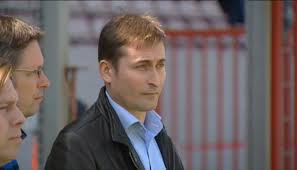March 13 – The Belgian Pro League, the country’s second tier, has approved a structural reform of its domestic club football. In the future there must be a strict division between professional and amateur football, according to the Pro League, with the number of professional teams being cut.
For months a reform had been on the cards. The clubs from the Belgian second division, the Proximus League, demanded change last October as they have struggled financially with the current league format. Many clubs may not meet the license requirements for next season.
The Proximus League has 18 clubs. The champions, together with the winner of the play-offs, gain promotion to the Jupiler Pro League, the Belgian top-flight. Sint-Truiden currently top the table with 68 points, ten more than Lommel United.
The managing director of Roeselare, Johan Plancke (pictured), proposed the far-reaching reform plans. His club languishes in 10th spot in the Proximus League. The proposal maintains sixteen teams in the top-flight, but the second division is trimmed down to eight teams. The plan allows for 24 professional clubs in Belgium.
“On the main principles of the Plan-Plancke everyone agrees,” said Pro League CEO Ludwig Sneyers. “All first class clubs must have the noses in the same direction: the division between amateur and professional clubs is to give oxygen to the remaining professional clubs.”
“Now this goes to our working group, which includes [presidents] Mehdi Bayat (Charleroi), Joseph Allijns (KV Kortrijk), Johan Timmermans (KV Mechelen), Vincent Mannaert (Club Brugge) and myself,” continued Sneyers. “The second division clubs should check [to get] enough support.”
In the lower leagues the reaction to the proposed reform has been unanimously negative.
“In this way football at the base is destroyed, and all that to make the rich even richer and keep the poor poor,” said Davy Sroka, captain of Patro Eisden Maasmechelen. “What will the amateur class represent? Becoming champion doesn’t entail any promotion. What kind of competition is that?”
“We may live in a capitalist system, but when a sport is completely subordinated to money, then something is profoundly wrong,” remarked Patro player Vastmans. “In Belgium football is thus an elite sport among 24 clubs and the rest is relegated to a union of amateurs.”
Contact the writer of this story at moc.l1744971165labto1744971165ofdlr1744971165owedi1744971165sni@i1744971165tnuk.1744971165ardni1744971165mas1744971165

